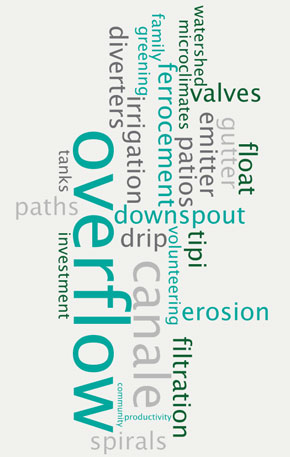The PermaDesign Weblog, with Nate Downey and Melissa McDonald!
Reading Land in New Mexico
Normally, I don’t hold court at posh resorts featuring bright-green golf courses. Especially on the Saturday night before Earth Day, I’m liable to seethe loudly about pompous fairways, water waste, lawnmower emissions, and toxic fertilizers, herbicides, pesticides, fungicides, and rodenticides.
Golf-resort sales departments rarely request such inflammatory rants, so it’s nice to sneak in under their radar. But this year I’m particularly tickled to be returning to the Buffalo Thunder Resort and Casino (and golf course) as a LitQuest Gala author, so I feel compelled to give the ironic resort kudos for strongly supporting LitQuest, its organizers, and beneficiaries (namely Partners in Education, Santa Fe Public Schools, and Santa Fe School for the Arts and Sciences).
Designed to combat illiteracy in New Mexico, LitQuest embodies the ultimate in creative and successful fundraising. First, a diverse array of Land of Enchantment authors is culled. Next, they pump us full of cocktails. For dinner, they split the writers up, one to a table, and ask us to keep conversations focused on our work.
Yes, it’s a dream gig, but the best part is that the 30-plus writers are asked to donate a package of five “essential” books for a silent auction. Although my 2015 lineup is still in its formative stages, I know that I will be fostering an ecological theme starting with Aldo Leopold’s A Sand County Almanac.
While stationed as a ranger in New Mexico, Leopold became a pioneer in the science of forestry. Much like Newton discovered gravity and Curie unearthed radioactivity, Leopold enlightened the world to the facts about human-caused soil-erosion. The lifelong conservationist also knew that people could combat erosion but that this would probably never happen unless we found a way to make ecology profitable.
As fire season looms in the Southwest, it’s important to understand that Leopold, the father of modern ecology, understood the necessity of fire here and that he learned this not by using traditional book literacy. Although Leopold was extremely well read, the Yale School of Forestry graduate had a keen sense of ecological literacy — how to read land — putting together telltale fire scars on tree bark, coming to conclusions, and ultimately developing and implementing plans for bringing stressed land back to healthy equilibrium.
Soon after coming to see fire as necessary, sadly for New Mexico, Leopold took a job in Wisconsin and moved his family there in 1924. He came back occasionally, but while helping to put out a wildfire on a neighbor’s property not far from Madison, the author died of a heart attack in 1948. He never saw his seminal 1949 book published, but his powerful legacy lives on.
Very few New Mexicans realize our deep connection to the foundation of the environmental movement. We would likely benefit if we were to strengthen this understanding. On Saturday, April 18, at LitQuest 2015, that’s what I’ll be talking about alongside some of the most ironic fairways in the world. For more info, please visit (http://www.litquestgala.com).
l
04/10/2015 | (0) Comments











Comments